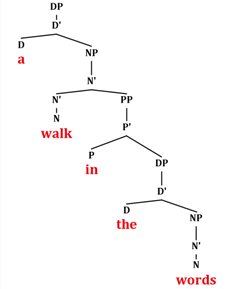Language Professional Blog Award 2011 is taking place right now. This contest gathered blogs by professional linguists, translators and interpreters to select the best bloggers in this field.
We are honored to introduce one of the nominees – Laura Payne and her blog A Walk in WoRds as our special guest.
Laura has a BA in Journalism and an MA in Linguistics. She teaches linguistics classes at both Wayne State University and Oakland University on an adjunct basis. And she created her blog to share fascination with language and to promote an appreciation and understanding of language to others.
You can vote for Laura here, just check the button next to A Walk in WoRds (3rd line from the the top), scroll down and press ‘vote’.
In the beginning a noun was a noun and a verb was a verb, but that was before the functional shift came along. In linguistics, the terms functional shift, category extension, conversion and zero derivation are all used in reference to the syntactic phenomenon that occurs when a particular word that has long been labeled for its use in one lexical category is suddenly used in a different and non-standard lexical category.
Of course, words often change their syntactic roles in a sentence with the addition or deletion of suffixes. The noun editor can become the verb edit when the –or is removed, and adding an –ing to the verb write can make writing a noun known as a gerund. Similarly, the noun box can become the adjective boxy when a –y is added; so this lexical role changing is not limited to just nouns and verbs. However, when a word changes its lexical category with the help of suffixes, this process is most accurately called affixing or derivation.
Derivational suffixes are so called because the use of one derives a different lexical category than that of the root word, as opposed to the use of inflectional suffixes which maintain a word’s lexical category but change grammatical characteristics such as tense and number.
A true functional shift, in the strictest sense, occurs only when a word shifts to a different part of speech without the help of an added derivational suffix; which is why one of the names for this phenomenon is zero derivation. Functional shifts occur in the forms of verb to noun, adjective to verb, noun to adjective, and adjective to noun.
Recently, a particularly popular and much discussed functional shift is the “verbing of nouns.” It may actually surprise some that the words verbing and verbification are not internet-user created neologisms but actually date back to 1766 and 1871 respectively according to the Oxford English Dictionary. The converting of nouns to verbs has long been a productive method of lexical expansion in the English language. In fact, some nouns have been used as verbs for so long that people tend to forget these words did not enter the lexicon with both uses (access, dress, host, mail and sleep).
How do these verbed nouns keep creeping into the English lexicon?
Technology and brand names certainly provide fodder for verbing:
John xeroxed the article for his class.
Lisa likes to microwave her lunch.
I tivo my favorite show so I never miss it.
The chef googled a recipe.
She facebooked her new boyfriend.
And the business world continually evolves nouns:
His business experience advantages Jack over his competition.
She journaled the conference call.
The company implements new procedures weekly.
Please inbox the proposal to me.
We should re-intention these coffee cans so we don’t have to landfill them.
Throw in an advertising campaign here and there too:
This is how we waterpark. (Spotted on a billboard somewhere in the Midwest)
So, while it may initially feel unnatural having many of these words exit the mouth as verbs, they may one day be commonly catagoried as such.
Do you want to know more about grammar categories and linguistics? Don’t forget to vote for A Walk in WoRds here.









